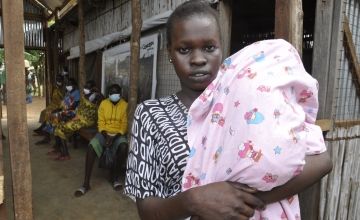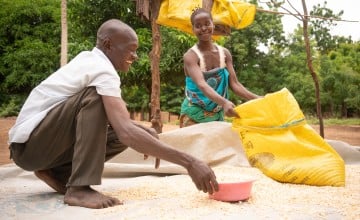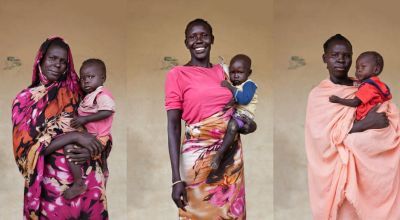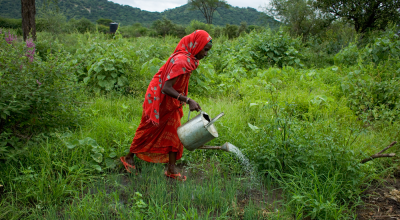
Read our 2024 annual report

Knowledge Hub
There’s no way around it: Hunger is sexist.
More women and girls around the world go hungry every day than men and boys. In many countries, that’s by design. Here’s what you need to know about women and hunger.
Why are women more affected by hunger?
Broadly speaking, women are less likely to have the same resources as men. This inequality of outputs leads to an inequality of outcomes. For instance, women in sub-Saharan Africa and southeast Asia make up 60% of the agricultural workforce. Yet only 13% of women own land. This can have a knock-on effect when other issues come into play.
Harmful gender norms
A number of patriarchal practices leave women more likely to go hungry than men. In many cultures, men are prioritised at mealtimes. If food is in short supply, many women will reduce the amount of food they eat — or skip meals entirely — to ensure that their partners and children have enough. In some cases, they aren’t given a choice in the matter.

This ties in with the notion of unpaid labour. Women perform more than double the amount of unpaid work in the home as men, and this notion of care carries over into household challenges like making sure everyone gets fed. Unfortunately, this means that women are also more likely to lose out.
Lack of legal protection
One of the reasons these norms are allowed to continue is that many countries don’t afford women the legal protections that guarantee gender equality. This enables everything from gender discrimination to gender-based violence. A lack of legal guarantees means that there is nothing for women to rely on when they do advocate for their worth.
Conflict
As the number of countries in conflict continues to grow, so too does the number of women experiencing food insecurity. War and conflict often leave women as the head of their household, either temporarily (while living in displacement or while their husbands and elder sons fight), or permanently if their partners are killed or disappear. Not only do they lose out on their partner’s income, they now also have to deal with the challenges women face during conflict. Violence may prevent them from getting to their farm. Or, as one woman in a village near Kouango, Central African Republic, told Concern, they may be forced to make impossible decisions in order to eat: “Food was sometimes exchanged for sex… Host populations want to have sex with women before they are hired."
Poor public health programmes
Women need to eat more — and more nutrient-rich — food during key periods in their lives, especially during pregnancy and breastfeeding. In countries with weak public health systems, however, this information is not always communicated. Harmful gender norms may also keep women from going to all of the necessary doctor’s appointments during this time. The effects of hunger on maternal health are not only a concern for the mother, but also potentially a lifelong issue for the children they have.

Women and hunger: Breaking the cycle
Educate women and girls
According to UNESCO, for every year of primary school a girl completes, her wages later in life go up by 20%. For every year of secondary school, her income goes up by 25%. This gives women more purchasing power, which is especially important for fighting hunger as women invest an average 90% of their income back into their family. Men only invest an average of 30 to 40%.
An added benefit to focusing on girls’ education is that school meal programmes can help ensure that they get the nutrients they need during the day.
Invest in women
As seen above, the UN has found that increasing the share of household income controlled by women changes spending in ways that benefit themselves and their families. In order to accomplish this, however, we need to close the gender pay gap. Currently, there is no country in the world that has achieved full gender wage parity — even those with the highest overall marks for gender equality.
Some of the main steps that can help to achieve equal pay for an equal quality of work include:
- Ensuring that women can own land and access other assets to run their businesses, including loans and credit
- Promoting women to leadership roles, including company boards, owners, and top managers, as well as at the policy-making level
- Building policies that work towards equal results versus equal opportunities
One programme Concern has employed towards this end are Village Savings and Loans Associations (VSLAs). In countries where women have fewer financial rights, VSLAs play an important role in gender equality, providing women access and ownership over income, savings, and decision-making power in the home. More than 70% of VSLA members are female.

Share the invisible labour
Balancing the number of unpaid labour hours between women and men, especially for those raising children, is another way of closing the gender gap — for hunger as well as income. The World Economic Forum shows that men work an average of 7 hours a day, and are paid for six of those hours. Conversely, women work 7.5 hours a day and are only compensated for three.
This goes back to the fact that women are more than twice as likely to take on the unpaid labour of raising a family and managing a household, including caring for children and elderly family members, cleaning, and cooking meals — meals they’re less likely to eat. Advocating for a more equal division of household labour is fundamental to changing gender attitudes that leave women out of the equation.
Equality of outcomes, not equality of input
True equity happens when everyone sees the same results, versus everyone receiving the same resources. There is a lot of “catch-up” work that has to be done to reach true gender equity. For example, in the agricultural industry, female farmers often miss out on getting the same tools, seeds, and other necessities as their male colleagues, meaning that their land is less productive.
But beyond giving them the same tools and seeds, we need to make sure they have the knowledge to effectively work their land (especially in an increasingly erratic climate crisis). We also must ensure that they have the long-term rights that protect their abilities to own land and stay informed and included in community and government-level activities to support local farmers.

Give women a seat at the table
Many of the changes we need to end gender-driven food insecurity — and gender inequality altogether — have to happen at the policy level. One of the best ways to achieve this is to make sure that women (of different races, sexual orientations, abilities, and age) are represented in governing bodies and local councils.
Research has shown that governments with gender parity are more likely to focus on laws that bolster gender equality. Globally, however, women only make up approximately 25% of national parliaments. It doesn’t end there, however: Women also must be represented on local committees and councils so that their perspectives are taken into account when decisions are made.





